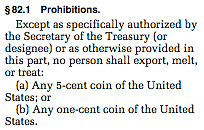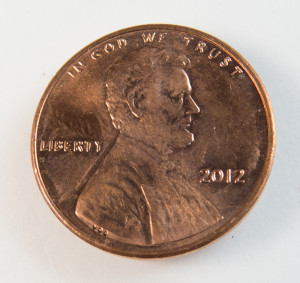While I was researching this project, I ran across some references to illegal uses of U.S. tender. But, as so often on the Internet, there were emphatic voices on both sides of this question, each insisted their understanding of the law was the correct one.
Defense 1: It’s art, therefore it’s protected free speech.
Defense 2: I have no intent to defraud anyone; I’m not going to try and pass these off as legal tender.
Prosecution 1: It is illegal to destroy, deface or melt legal tender, because it is the property of the U.S. government.
Prosecution 2: It is illegal to melt coins in order to retrieve the metal.
I wrote to the U.S. Mint on the contact form. They dodged the question:
We would like to inform you that you have contacted the United States Mint Customer Support Team. Unfortunately, at this time we have no confirmed information about whether or not it is legal to perform such activities with monetary coins. We apologize for the inconvenience.
I suspect that this is because the customer support for the Mint is outsourced, and they don’t want to be telling people in writing that it’s legal to do this or that with coins.
The U.S. Mint site refers to this vaguely:
I couldn’t find any cases of artists being arrested for abusing U.S. coins. That law was passed in 1948 – but I don’t have any 1948 coins… So I’m adding 4+8 = 12, and using a 2012 coin.
A press release about the 2006 anti-melting regulations says,
Specifically, the newly enacted final regulation prohibits, with certain exceptions, the exportation, melting or treatment of one-cent and 5-cent coins. Some of the exceptions allow for small amounts of these coins to be exported as pocket change, and for recreational and numismatic purposes. Other exceptions include the treatment of minor quantities of these coins for educational, amusement, novelty, jewelry and similar purposes. However, the public should review the regulation for precise terms and limitations of the exceptions.
The new regulation authorizes a fine of not more than $10,000, or imprisonment of not more than five years, or both, against a person who knowingly violates the regulation. In addition, by law, any coins exported, melted, or treated in violation of the regulation shall be forfeited to the United States Government.
I asked my banker about it when I picked up the pennies. She didn’t know, either.
We both recalled seeing various pieces of jewelry, boxes, frames and decorative items made with coins. And we are both old enough to remember the arcade machines where you could put in a penny and it would come out flattened smooth on one side. People used to put coins on the railroad track to flatten them.
She was careful not to give me any legal advice, but the unspoken conclusion has to be: Who cares? Will the U.S. government actually swoop down to Jasper, Georgia and arrest me for making a sculpture in honor of my father?
If they arrest me, I hope I can find a good First Amendment lawyer.
UPDATE: See this post for the definitive wording in the regulations about this.

